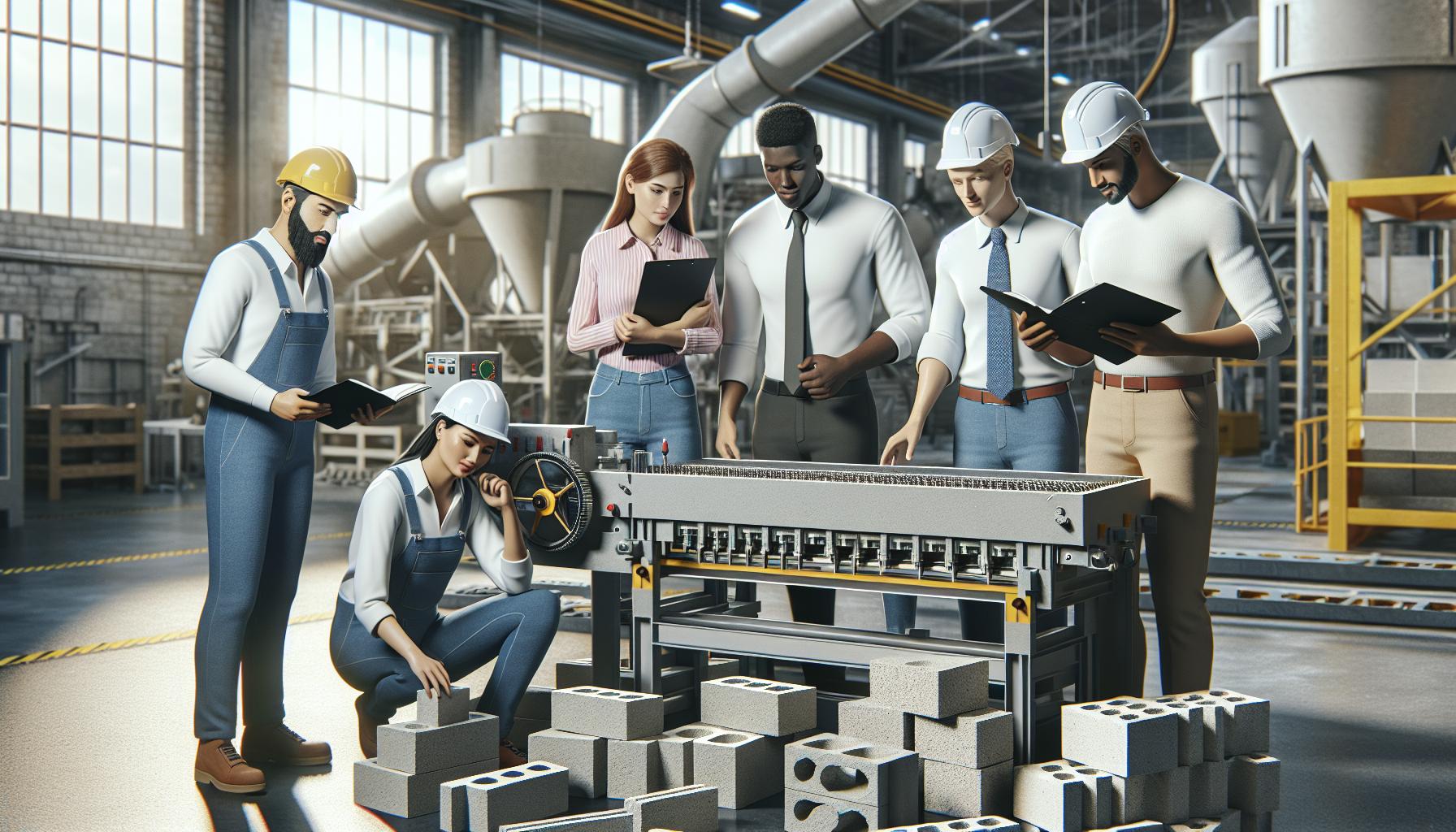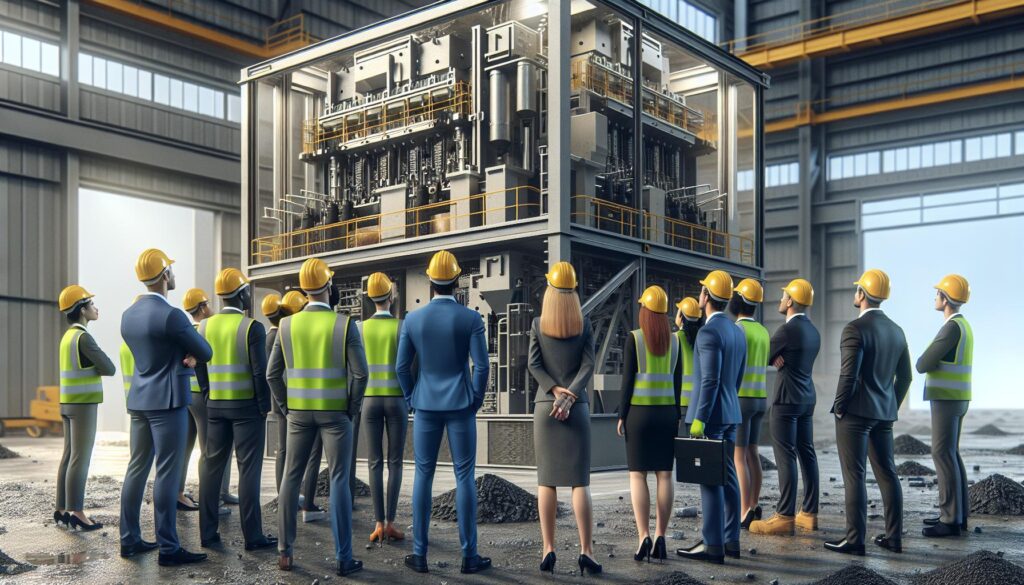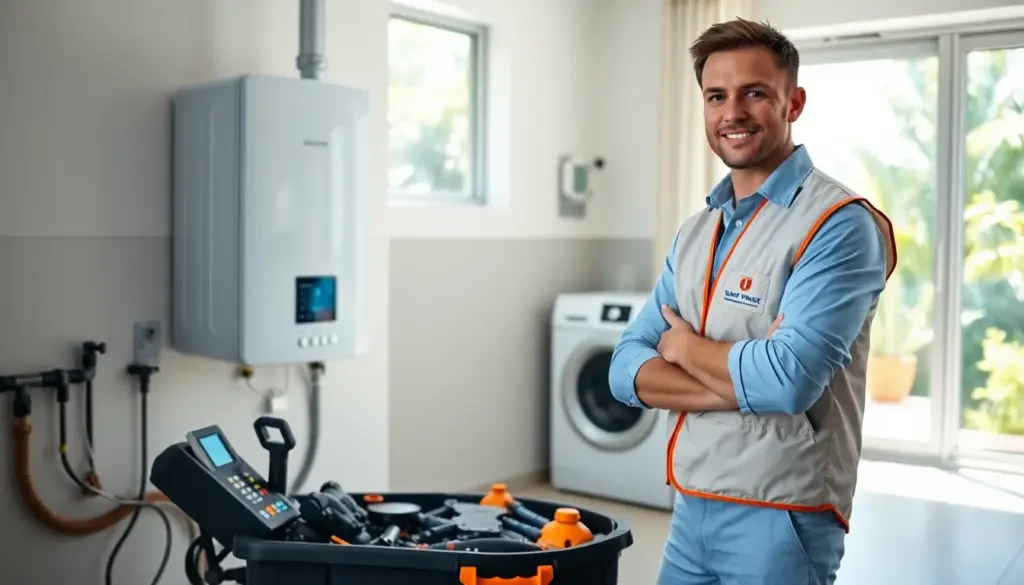Choosing the right concrete block making machine can significantly impact a business’s efficiency and profitability. With various options available, it’s crucial for companies to understand their specific needs and production goals. This article explores essential factors to consider, helping businesses make informed decisions that align with their operational demands.
Understanding Concrete Block Making Machines
Concrete block making machines produce blocks used in construction. These machines vary in size, capacity, and technology, influencing production efficiency and cost.
Types of Concrete Block Making Machines
- Manual Machines
Manual machines require human labor for operation. Operators mix materials and fill molds, making them suitable for small operations or low-volume production. - Semi-Automatic Machines
Semi-automatic machines use mechanization for part of the process. They minimize manual work while still requiring some operator input. These machines fit medium-scale production needs. - Fully Automatic Machines
Fully automatic machines handle every production step. They mix, mold, and cure blocks without human intervention, ideal for high-volume production and large businesses. - Production Capacity
Determine the desired output, measured in blocks per hour. Machines range from small-scale, producing hundreds of blocks daily, to large-scale, producing thousands. - Mold Types
Molds shape the concrete into specific designs. Assess available mold options to ensure the machine meets project requirements. - Power Source
Power sources include electric and diesel options. Consider the operational environment and availability of resources when selecting a machine. - Durability and Maintenance
Evaluate build quality and ease of maintenance. Machines constructed from high-quality materials offer longevity and reduced downtime. - Cost
Compare initial purchase costs and operational expenses. Budget constraints and expected return on investment greatly influence machine choice.
Choosing the right concrete block making machine entails evaluating production needs against available options while considering features that impact efficiency and longevity.
Key Factors to Consider

Choosing the right concrete block making machine requires careful evaluation of several key factors to align with business needs.
Production Capacity
Production capacity refers to the number of blocks a machine can produce within a specific timeframe. Businesses must assess their daily or monthly output requirements to select a machine that meets these goals. Machines are available in different capacities, typically ranging from a few hundred blocks per day to several thousand. Understanding production goals helps ensure that the chosen equipment supports operational demands without causing bottlenecks.
Type of Concrete Blocks
The type of concrete blocks the business intends to produce impacts the selection of the machine. Different machines accommodate specific block shapes, sizes, and strengths. Options include standard solid blocks, hollow blocks, or more complex designs. Reviewing the desired product specifications ensures the machine selected can produce the intended block types, maintaining quality and consistency in output.
Automation Level
Automation level significantly influences production efficiency. Machines range from manual to fully automatic, each offering distinct advantages. Manual machines require more labor but have lower initial costs, while fully automatic machines streamline the process and reduce labor needs, resulting in higher productivity. Evaluating the level of automation necessary for the business’s operations helps determine the best fit for budget and production goals.
Assessing Quality and Durability
Quality and durability are essential factors when selecting a concrete block making machine. These aspects determine the machine’s long-term performance and its influence on production efficiency.
Materials Used
The materials used in construction impact a machine’s overall durability. High-quality steel and robust components improve longevity and resilience. Machines constructed with corrosion-resistant materials withstand harsh working environments, ensuring operational reliability. Manufacturers of reputable machines often use superior materials, providing warranties as assurance of quality.
Maintenance Requirements
Maintenance requirements play a vital role in ensuring the machine’s longevity. Regular upkeep minimizes wear and damage, ensuring optimal functionality. Machines with simple maintenance procedures facilitate easy access to parts for inspection and replacement. It’s critical to review the manufacturer’s recommendations for maintenance schedules and required tools. Adhering to these guidelines can significantly reduce downtime, extending the machine’s operational life.
Cost Analysis
Cost analysis plays a crucial role in choosing the right concrete block making machine. It considers both initial investment and long-term operating costs, ensuring businesses make sound financial decisions that align with their production goals.
Initial Investment
Initial investment refers to the upfront cost of purchasing the concrete block making machine. This includes the price of the machine itself, shipping, installation, and any necessary training for operators. Manual machines typically require a lower initial investment, ranging from $5,000 to $15,000. Semi-automatic machines, on the other hand, can range from $15,000 to $50,000, while fully automatic machines often exceed $50,000, depending on their production capacity and features. Businesses should assess their budget and production volume to determine which type of machine aligns with their financial constraints and production needs.
Long-term Operating Costs
Long-term operating costs encompass ongoing expenses related to operating the concrete block making machine. These costs include electricity, maintenance, labor, and raw materials. For instance, electricity costs may vary based on machine type and usage; fully automatic machines may require more energy than manual models, impacting overall operational expenses. Maintenance costs, including repairs and spare parts, can significantly affect a machine’s lifespan. Regular maintenance helps reduce costs over time. Labor costs depend on the level of automation; semi-automatic and fully automatic machines generally require fewer labor resources than manual machines. Evaluating these costs aids businesses in understanding the total cost of ownership and making informed choices that support profitability.
Comparing Different Machines
Selecting the right concrete block making machine involves evaluating different options available on the market. A clear understanding of each type helps businesses make informed choices based on their specific needs.
Market Options
Several concrete block making machines exist in different categories, each serving distinct production requirements. Manual machines operate with minimal automation, ideal for small-scale production where labor availability is abundant. Semi-automatic machines offer a balance between manual operation and automation, increasing efficiency while still requiring some manual input. Fully automatic machines stand out for large-scale production, providing high output and reduced labor costs.
Business owners should research manufacturers and suppliers to identify the best models within these categories. Factors to consider include brand reputation, machine features, technological advancements, and after-sales support. Forums and industry expos can offer insights into the latest innovations available in the market.
Customer Reviews and Case Studies
Customer reviews provide valuable insights into machine performance and reliability. Analyzing feedback helps businesses learn from others’ experiences, including strengths and weaknesses of specific machines. Reviews often highlight issues related to machine durability, maintenance, and production efficiency.
Case studies demonstrate real-world applications of machines and their impact on production processes. Businesses can examine examples where similar companies faced challenges and how different machines helped resolve those issues. Success stories reinforce the importance of selecting a machine aligned with specific production goals. Combining customer feedback and case studies can guide businesses in making more confident, strategic decisions.
Conclusion
Choosing the right concrete block making machine is essential for businesses aiming to improve efficiency and profitability. By carefully evaluating production capacity, automation levels, and maintenance needs, companies can make informed decisions that align with their operational goals.
Investing in a machine that meets specific requirements not only boosts production but also contributes to long-term success. Additionally, considering customer reviews and case studies can provide valuable insights into machine performance.
Ultimately, a well-researched choice will lead to improved productivity and a stronger competitive edge in the market.
Frequently Asked Questions
What factors should I consider when choosing a concrete block making machine?
When selecting a concrete block making machine, consider factors such as production capacity, required mold types, power sources, durability, and maintenance needs. Additionally, assess the level of automation that fits your production goals and budget to ensure you choose a machine that aligns with your specific business requirements.
What are the different types of concrete block making machines?
There are three main types of concrete block making machines: manual, semi-automatic, and fully automatic. Manual machines require more labor and have a lower production capacity, while semi-automatic machines offer a balance of efficiency and control. Fully automatic machines provide the highest output but involve a larger initial investment.
How does production capacity affect my machine choice?
Production capacity is crucial as it determines the number of blocks a machine can produce in a given time. It’s essential to align this capacity with your business output requirements to avoid overproduction or underproduction, which can significantly impact efficiency and profitability.
What role does automation play in concrete block production?
Automation levels affect production efficiency and labor needs. Fully automatic machines reduce manual labor and can handle higher volumes, while manual options may require more hands-on work but have lower costs. Assess your operational goals to determine the right level of automation for your business.
Why is machine durability important?
Durability influences a machine’s long-term performance and efficiency. Selecting a machine constructed from high-quality materials and corrosion-resistant components can enhance its reliability and lifespan. This leads to fewer downtimes and lower maintenance costs over time.
How do I assess maintenance requirements?
To evaluate maintenance needs, consider the manufacturer’s recommendations and the ease of access to components for repairs. Regular upkeep is crucial to minimizing wear and extending the operational life of the machine, ensuring it functions optimally within production timelines.
What should I include in my cost analysis for a concrete block making machine?
Your cost analysis should encompass the initial investment, including purchase price, shipping, and installation, along with long-term operating expenses like electricity, maintenance, labor, and raw materials. Understanding these costs helps align financial decisions with production goals for better profitability.
How can customer reviews help in machine selection?
Customer reviews provide valuable insights into the performance and reliability of specific machines. Analyzing feedback from other users and studying case studies can help you identify strengths and weaknesses in various models, enabling more informed and strategic selection decisions.
What is the significance of mold types in block production?
Different machines accommodate varying mold types, which impacts the shapes, sizes, and strengths of concrete blocks produced. When choosing a machine, ensure it can handle the specific mold types you need for your production targets and construction projects.
How can I ensure I’m selecting a reputable manufacturer?
Research potential manufacturers by evaluating their reputation, machine features, technological advancements, and after-sales support. Look for established brands with positive reviews and substantial customer feedback to ensure reliability and quality in your machine selection.


